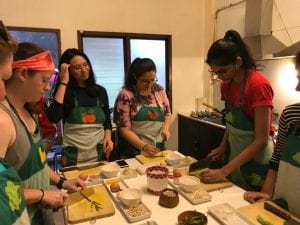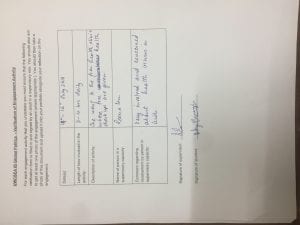LO 7 Recognise and consider the ethics of choices and actions
Project Week – Preparation
Project Week – Investigation
LO 6 Demonstrate engagement with issues of global significance
Tennis U19-B Reflection #2
LO 5 Demonstrate the skills and recognise the benefits of working collaboratively
Kahaani Reflection #1
Humanities Magazine Reflection #3
EE Final Reflection
My resilience has strengthened during the EE process as after writing my first draft, I realised that only having secondary data and a small amount of primary data was not allowing me to fully explore my research question. I then had to gather additional primary data, which was challenging because the casino had strict privacy policies and did not disclose much information themselves. Therefore, I created a survey and stood outside the casino for hours each day to gather quantitative data, which strengthened the analysis and conclusions of my EE. Conducting a survey also improved my communication skills, because I had to attract numerous busy casino visitors to fill out my survey, to gain different perspectives on the issue. This involved fully explaining my investigation, and its goals and purposes to each respondent, trying to ensure they give truthful responses, as the quality of my communication would impact the accuracy and reliability of my investigation.
Reflective Conversation #2
The EE process has strengthened my analytical skills, as I had to change the focus of my research question, which opened up room to explore government policies in more detail. I also decided to change from investigating only the occurrence of problem gambling to its impact, which created a balance between the qualitative and quantitative aspects of my EE. My communication skills also improved, especially during gathering primary data from the main organization in Singapore that handles problem gambling, because they are a psychiatric facility as well and have stringent rules regarding privacy. Therefore, I was not allowed to physically go to the organization, so through communicating with them only by Email, I had to secure an interview with them. The interview was conducted over Email as well, so it limited the scope of my questions and their answers, but it did give me numerical data as well as qualitative data to support my investigation.
EA Reflections
Engagement at Uday Foundation
I felt that my engagement activity at Uday Foundation was extremely rewarding, especially since I had been in contact with them for a long time and finally got to see their set up and the children they work with in person. I toured their health clinic, where they gave free health checkups to underprivileged children. I also had the opportunity to interact with the children there, and talk to them about their schooling and their home life. Volunteering at Uday Foundation around its health clinic allowed me to see the disparities that people in India face with regards to healthcare inequality. NGOs like the Uday Foundation significantly contribute to closing this gap, particularly with their free health clinic, which offers free checkups for children, as well as routine vaccinations, which ties directly into SDG 3, strand 3.8. Free schemes like this make a difference at a micro level, and really impact the quality of healthcare offered state wide, to children of low socio-economic status, thus helping in a small manner the achievement of SDG 3. As I witnessed, the Uday Foundation also helps the development of the country by providing humanitarian aid during, for example, natural disasters and floods, very prevalent in that part of India.
Interview at Observer Research Foundation
I conducted an interview with an expert in health economics, Mr Oommen Kurian. We discussed the current situation of healthcare inequality in India. He talked about how the current healthcare and insurance model in India impacted the development of the country. I even asked him about the Sustainable Development Goals, particularly the ones concerning food and nutrition, and maternal and foetal health. As an extension, we even talked about the development goal regarding vaccination policies in India, and their implementation, for example, the polio vaccination scheme. These areas under healthcare tie directly into SDG 3, and with regards to my research question, we discussed how the rapid development that India has witnessed is slowly becoming apparent in the healthcare it offers, however, this is mostly seen only in more developed states at the moment. He also said that NGOs are beneficial mostly only around the community they serve, and that whether they affect the development and poverty alleviation of the country as a whole is controversial.
Memoirs of a Pioneer Generation Reflection #2
LO6 Demonstrate engagement with issues of global significance
Students are able to identify and demonstrate their understanding of global issues, make responsible decisions and take appropriate action in response to the issue, either locally, nationally or internationally.
A while ago, we walked into our very first session at the home and were greeted by nearly all new faces, which was a change from the familiar ones we were used to. This time instead of focusing on building a relationship with just one person, we took a more holistic approach and would sort of take turns talking to different elders. From this experience, I have developed a keener understanding and appreciation for the experiences that elderly people in Singapore have been through to arrive at the Lion Befriender’s home.
Many of them were born out of Singapore, and their families live outside of Singapore, most frequently in Indonesia and Malaysia. Most of them have had to work hard to get to where they are now, one lady in particular who I was talking to was the sole breadwinner of the family, even at her age. She was talking about her tense relationship with her daughter, and how that has adversely affected her health. Lion Befriender’s home is the one who got her in contact with an excellent doctor practicing in the area, regulate her medications, and jointly keep a medical record of her medications and blood pressure at different times during the day. From her story, I began thinking about the role of old age homes in our society, and how often there can prevail a stereotype that the elderly people there are “unwanted” by their families. I realise now that is stereotype is extremely misguided, and really diminishes the role that old age homes play in the lives of families all around the world. They provide a network of support to the individuals and their families, and have a personal, meaningful, and helpful relationship with all the people in their home.









